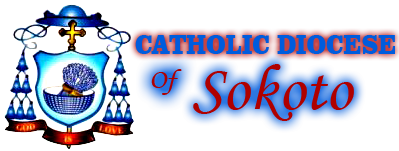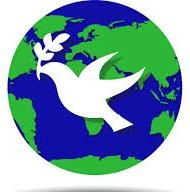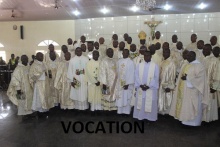Our attention has drawn to a misleading article on the purported Islamization of Catholic Bishops by one Pastor Amos Abella Musa of the Redeemed Church of Christ in Bauchi, Bauchi State which is making the rounds on social media platforms. The piece is actually not worth responding to because it demonstrates the lack of depth of what Christianity is all about and the role of the Church in interfaith relations. However, given where it is coming from, its misleading nature and the fact that it is going viral, this writer has attempted to counter the narrative by setting the facts straight.
Well, before I take the writer out of the ring, it is important to review his fallacies of hasty generalization. After introducing himself, the Pastor went ahead to express his disappointment in the Catholic Bishops of Nigeria for posing as the acolytes of the Sultan of Sokoto, especially “their BIG MAN, a Cardinal and another BIG MAN, the leader of them all, [for] accepting to wear that Islamic induction vestment of ‘DANKISHI’ meant for Muslims all over the world, in particular, the Northern Nigerian Muslims” when they paid a courtesy call on the Sultan on September 7 during their first plenary which held at Pinnacle Guest Inn and Resort, Sokoto from September 6-14, 2018.
He added that since the two Bishops whom he did not name but are presumably the Archbishop of Abuja, John Cardinal Onaiyekan, and Most Rev. Dr. Augustine Akubeze, the Archbishop of Benin and President of the Catholic Bishops’ Conference of Nigeria (CBCN), are not from Northern Nigeria, he expected that the Catholic Bishop of Sokoto, the Most Rev. Dr. Matthew Kukah, who knew better, should have told them the implication of wearing the garb.
Well, does the writer know what it takes to be a Catholic Priest let alone be a Bishop or Cardinal? Perhaps it is important to educate Pastor Musa that his conclusion is too simplistic and naïve. The fact that the two Bishops are not from the north does not reduce their knowledge of Islam, the region in question and the culture of its people. There is no Catholic priest anywhere in the world that was not trained on the rudiments of Islam while in the seminary. We would come back to this.
To accuse members of the CBCN of playing to the gallery because of a courtesy visit they paid to the Sultan is insulting and disrespectful. That singular phrase deserves an unreserved apology (This is my personal opinion). However, whether this apology comes or not is inconsequential. The point is, the author of the uncoordinated piece wanted to play on the gullibility of some Christians by claiming that since he is a convert from Islam, he knows the Islamic religion and culture more than anyone else – This is another grave error which needs correction. There are Christians as there are Muslims who were born into those religions but have little or no knowledge about their religion except what they leant in the Penny Catechism or during Childhood Koranic Classes – As such, this position is a grandstanding in futility.
On his position pertaining what he calls “DANKISHI” which is supposed to be “Dashiki” except he is giving us the Hausa variant, his conclusions are farfetched. For want of clarification, “Dashiki is a colourful men’s garment widely worn in West Africa that covers the top half of the body. It has formal and informal versions and varies from simple draped clothing to fully tailored suits…a common form is a loose-fitting pullover garment, with an ornate V-shaped collar, and tailored and embroidered neck and sleeve lines.” From this submission, it is crucial to note that some Muslims and Christians in Sub-Saharan Africa especially Algeria, Djibouti, Egypt, Libya, Morocco, Somalia, Sudan, Tunisia, Nigeria et al wear the apparel. It is also important to note that not all Muslims wear the “Dashiki.”
A serious question begging for an answer is, if the simple symbolic gesture of turbaning with “Dashiki” translates to being initiated into Islam, what is the position of the Shahada or profession of faith in Islam? Why does Musa claim that any Christian who is turbaned with “Dashiki” “has been inducted into Islamic Jihadistic warfare in Nigeria and other places?” For me, this is the most uncharitable part of his article that should be thrown into the waste bin. What is also worrisome is his attempt to reduce the wealth of experience, spiritual pedigree and concerted efforts of the Bishops in question at ensuring intra-faith cohesion in Nigeria within the last 50 years into a waiting army for Islamic Jihad. Well, you have intelligent Nigerians who know what the Catholic Church stands for to contend with!
It is heartrending is that in a country where the political class is often accused of dividing Nigerians along ethnic, political and religious fault-lines, a pastor is blowing the whistle of divisiveness. Another serious cause of concern is the writer’s unformed mixing of religion with politics. I urge him to take some lessons in the relations between Church and State. Perhaps he needs to be reminded that if anything, former President Olusegun Obasanjo should be commended for the way he handled the issue of the full implementation of Sharia Law in Nigeria. Knowing that the matter is a sensitive one, on March 1, 2000, he said, “Sharia Law will die a natural death” and it did. Why did you fail to mention those who made money for advertising Sharia and lied to their foreign donors about the possibility of its full implementation throughout Northern Nigeria?
The claim that the courtesy visit of the CBCN “confirmed that the Sultan is the most powerful person in Nigeria … [and] he has under his ‘foot’ all the religious leaders of the two main religions in Nigeria, Christianity and Islam” is reckless. When the present Emir of Kano, Mohammed Sanusi II was invited to the Papal Basilica of Saint Francis of Assisi in Italy alongside John Cardinal Onaiyekan and Bishop Matthew Kukah as well as over 400 religious leaders for the annual World Day Prayer for Peace in 2016, was the emir converted to Christianity? Did the occasion confirm that the over 400 religious leaders in attendance were under the Pope?
The reference to the former US Secretary of State, Senator John Kerry visiting the Sultan to substantiate a false claim is sickening. There is no arguing the fact that Kerry is a Catholic but the point is, he didn’t come to Nigeria to represent the Vatican. The US has its diplomatic interests and knows best why their Secretary of State visited the Sultan at the time. Besides, the Vatican has a sitting Papal Nuncio in Abuja. If it wants to engage the Sultan, the Pope’s representative would do the needful.
It is laughable that the writer charged Christians in Nigeria to realize that their faith is in their own hands saying: “You don't expect that many of all those who parade themselves as Christian Church leaders today will defend you and your faith in Jesus Christ at critical moments.” Is this not beating the drums of war? Well, let me remind our friend and readers that the red skull cap (zucchetto), red bottoms and red stockings Bishops wear signify martyrdom. Suffice it to opine that as those saddled with the responsibility of teaching, preaching and sanctifying the people of God, Catholic Bishops are the direct successors of the apostles who represent Christ the Good Shepherd who came not to be served but to serve and to give his life as a ransom for his flock (Matthew 20:28).
While his claim that “It was through such tactiful (sic) friendship that they whole of Northern Nigeria got Islamised by the invading Fulani herdsmen from Upper Guinea, led by Sheik Uthman Dan Fodio, the founder of Sokoto Caliphate” is a socio-political debate for another day especially for students of history and political science, it is important to ask why the purported Jihad failed in Northern Nigeria especially in the Middle Belt Region which is yet to be recognised by the Constitution?
Does the upsurge of the Christian faith in terms of the establishment of many Dioceses and Christian Denominations in an area where only one faith flourished before and after Dan Fodio without prejudice to Kanem Borno Empire which had envoys in other countries for over hundred years before Nigeria’s independence not speak volume? Granted that there are indictors that the activities of the gun-wielding suspected herdsmen is an attempt to entrench Jihad in the area under review, it is difficult to comprehend how a simple gesture of friendship which the Bishops extended to the Sultan translates to embracing Jihad against the flock they hold so dear and are ordained to defend with their lives!
Perhaps the writer forgot that the Sultan is not only the President General of the Nigeria Supreme Council of Islamic Affairs but also the Emir of Sokoto. Since the Bishops who have consistently preached the need for peaceful coexistence and living in a pluralistic society were in his domain, it was necessary to pay him a solidarity visit as the leader of the Islamic Ummah in Nigeria. What is more, the Fathers of the Church acted as Jesus would.
What was Jesus’ reaction to the woman with the issue of blood who touched him? (Luke 8:43-48). How did he react to the woman who poured oil on his feet and wiped them with her tears? (Luke 7:36-50). What lesson did Jesus convey when he gave the parable of the Good Samaritan? (Luke 10:25-37). Did he not eat in the house of Matthew the tax collector? (Luke 5:29-39). Did he not tell Zacchaeus, today, salvation has come to your house? (Luke 19:9).
As an institution that has a history of over 2000 years behind her, the Catholic Church is coming from an erstwhile Vatican I Council position which held that there is no salvation outside the Church. This prevented many of its members from seeing or recognizing the good in others. It took a bold and magnanimous John Paul II to apologize for the mistakes of the Church. To correct this anomaly, the Fathers of Vatican II Council in Nostra Aetate (8/10/1965) – The Declaration on the Relation of Church to Non-Christians, which Pope Benedict XVI calls the Magna Carta of interreligious dialogue, having acknowledged that in the past the relation between Christians and Muslims was fraught with suspicion and fear, now “pleads with all to forget the past, and urges that a sincere effort be made to achieve mutual understanding...” The Church Fathers believed that when mutual understanding between Christians and Muslims is realised, only then can we “preserve and promote peace, liberty, social justice and moral values...”
This is why the Catholic Church ceases every opportunity to not only extend the olive branch to Muslims but seek good wherever it is found. This brings us to the Church’s teaching on dialogue with Muslims. To further ensure the universality of the message of salvation, in 1984 the Pontifical Council for Interreligious Dialogue, which Bishop Kukah is a current member, made a case for dialogue and mission by proposing four kinds of dialogue aimed at healing a broken-world. I crave the indulgence of the reader to briefly explain each.
The first is the dialogue of life. Dialogue of life happens in a situation “where people strive to live in an open and neighbourly spirit.” It happens in the ordinary events of life – work-place, institutions or in the neighbourhood. Here, people get to know each other and strive to live in peace with them. For instance, when we go to the bank or market, dialogue of life takes place as customers are not treated based on their religion. This kind of dialogue requires patience, perseverance as well as personal and communal effort anchored on our common humanity.
The second is the dialogue of action. Wherever Christians and Muslims work together to promote peace, liberty, social justice and moral values, dialogue of action takes place. These creeds stand for justice, peace and respect for life as well as human dignity. Since both religions share common human values and see the human as the custodian of the earth endowed with the power to use the earth’s resources justly, it is an imperative for Muslims and Christians “to collaborate in addressing social concerns based on these common religious motives and values” – This is dialogue of action. Many Christians have saved Muslims and Muslims, Christians against attacks during crisis. This is dialogue of action.
The third is theological dialogue or dialogue of experts. When academics, experts, theologians or religious leaders of various religions meet to clarify issues, create greater understanding, they are engaged in dialogue of experts. This kind of dialogue helps to remove prejudices that blind religious leaders of a particular creed from seeing the good in another faith. It also helps them to appreciate each other’s spiritual values while having a better understanding of their differences. An example of this is the Christian-Islam Congress which was co-organized with the World Islamic Call Society (WICS) in Tripoli in 1976. The visit of the Bishops to the Sultan could be likened to dialogue of experts.
The fourth is dialogue of religious experience. This kind of dialogue takes place at interfaith prayer sessions where religious texts are jointly read and reflected upon by members of both faiths. This kind of dialogue also requires a level of expertise. While this type of dialogue requires expertise, it could take place in local communities when there is a genuine need to come together to seek the face of God – Such occasions could be during draught or famine. An example was when Pope John Paul II visited the Umayyad Mosque in 2001 becoming the first Pope to visit the Mosque, 1,363 years after Caliph ‘Umar Ibn Khattab visited the Church of the Holy Sepulchre in Jerusalem.
In conclusion, I urge Pastor Musa and others like him to furnish themselves with the role of the Church in entrenching peace and dialogue with the People of the Book or of Living Faith. It is necessary for Church leaders to do their homework before any public engagements. If anything, rather than speak ill about an act of friendship and solidarity demonstrated by our revered Church Fathers, the Bishops should be commended for their larger than life approach to religion and exemplary leadership in Nigeria and beyond.
Fr. Justine Dyikuk is the Communications Director of Bauchi Diocese, Nigeria –justinejohndyikuk@gmail.com.
Discussion


